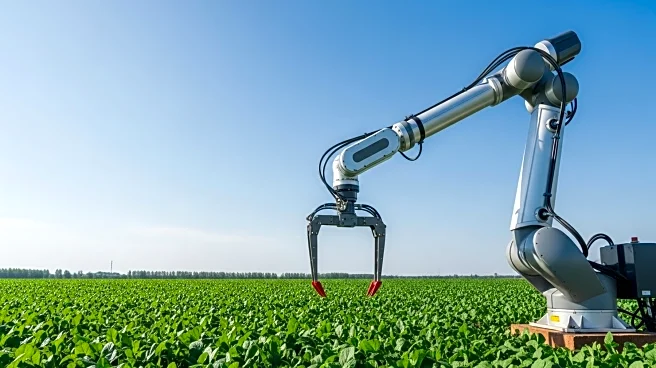What's Happening?
The eighth annual Chinese Farmers' Harvest Festival in Dahuchenjia village, Zhaoyuan city, showcased the transformative impact of artificial intelligence and robotics on agriculture. The event featured advanced technologies such as robot dogs equipped with multispectral cameras and intelligent recognition algorithms, which scanned crops and provided detailed reports on farmland conditions. Additionally, fruit-picking robots with biomimetic mechanical hands demonstrated precision in harvesting. The festival highlighted the integration of smart technology in farming, including drones for crop spraying and unmanned tractors, emphasizing the shift towards automated agricultural operations.
Why It's Important?
The integration of AI and robotics in agriculture represents a significant advancement in farming efficiency and sustainability. By automating tasks such as crop monitoring, pest detection, and harvesting, these technologies can reduce labor costs and increase productivity. This shift is crucial for addressing challenges such as food security and rural development. The widespread adoption of smart farming techniques can lead to more consistent crop yields and improved resource management, benefiting both farmers and consumers. As China continues to expand its high-standard farmland and mechanization rates, these innovations could serve as a model for global agricultural practices.
What's Next?
The continued development and deployment of AI and robotics in agriculture are expected to further enhance farming practices. As these technologies become more accessible, farmers may increasingly rely on automated systems for various agricultural operations. This could lead to a reduction in manual labor and a shift towards more technologically driven farming methods. Stakeholders, including agricultural institutions and policymakers, may focus on promoting these innovations to ensure sustainable growth in the sector. Additionally, the success of such technologies in China could encourage other countries to adopt similar approaches, potentially leading to a global transformation in agriculture.
Beyond the Headlines
The ethical implications of AI and robotics in agriculture include concerns about job displacement and the need for new skill sets among farmers. As traditional farming roles evolve, there may be a demand for training programs to equip workers with the necessary skills to operate and maintain advanced machinery. Furthermore, the reliance on technology raises questions about data privacy and security, as sensitive information about crop conditions and farm operations is collected and analyzed. Addressing these issues will be crucial to ensuring the responsible and equitable implementation of smart farming technologies.










